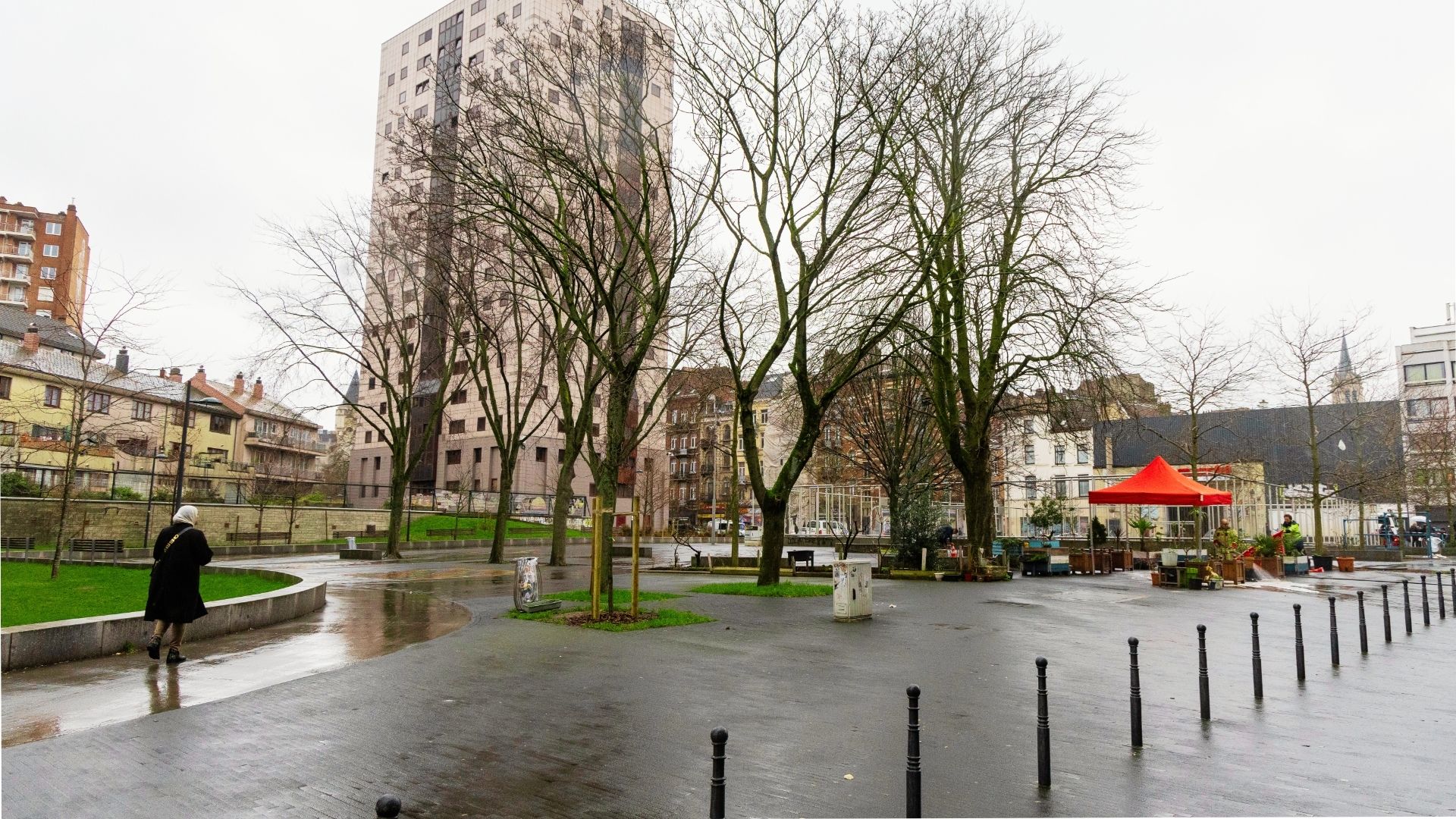"All they are trying to do is tarnish the image of Brussels and my commune," the Mayor of Saint-Gilles Jean Spinette said in response to a viral video of a ‘supermarket of drugs’ from his municipality, recently shared by a Flemish minister despite it being old.
"Drugsshopping [sic] queue in Brussels, capital of Europe. We need to take back control," exclaimed the former Belgian Minister for Migration, Theo Francken (from right-wing N-VA) when posting the video in both English and Dutch. It has now been viewed over 200,000 times.
In the images, an orderly line of people patiently wait to buy their fix from a couple of young drug dealers in a square in the Brussels municipality of Saint-Gilles. It is broad daylight, there are school children passing by.
The scene is taken from Saint-Gilles’s Square Jacques Franck, which made headlines this year after a series of shootings between rival drug trafficking gangs rocked the area, resulting in the death of one street dealer in February. Porte de Hal has been at the centre of the recent expansion of these drug mafias in Brussels, with large amounts of money pouring into these deprived neighbourhoods from outside the city and country.
Yet the video shared by Francken was taken in June last year. It was posted on social media platform X (formerly Twitter) by Brussels-born artist David Crunelle in response to an article by The Brussels Times in August.
Crunelle's post aimed to contextualise the drug problem with a call to the Federal Government to help the vulnerable subjects in the video – both the addicts and the fresh-faced dealers.
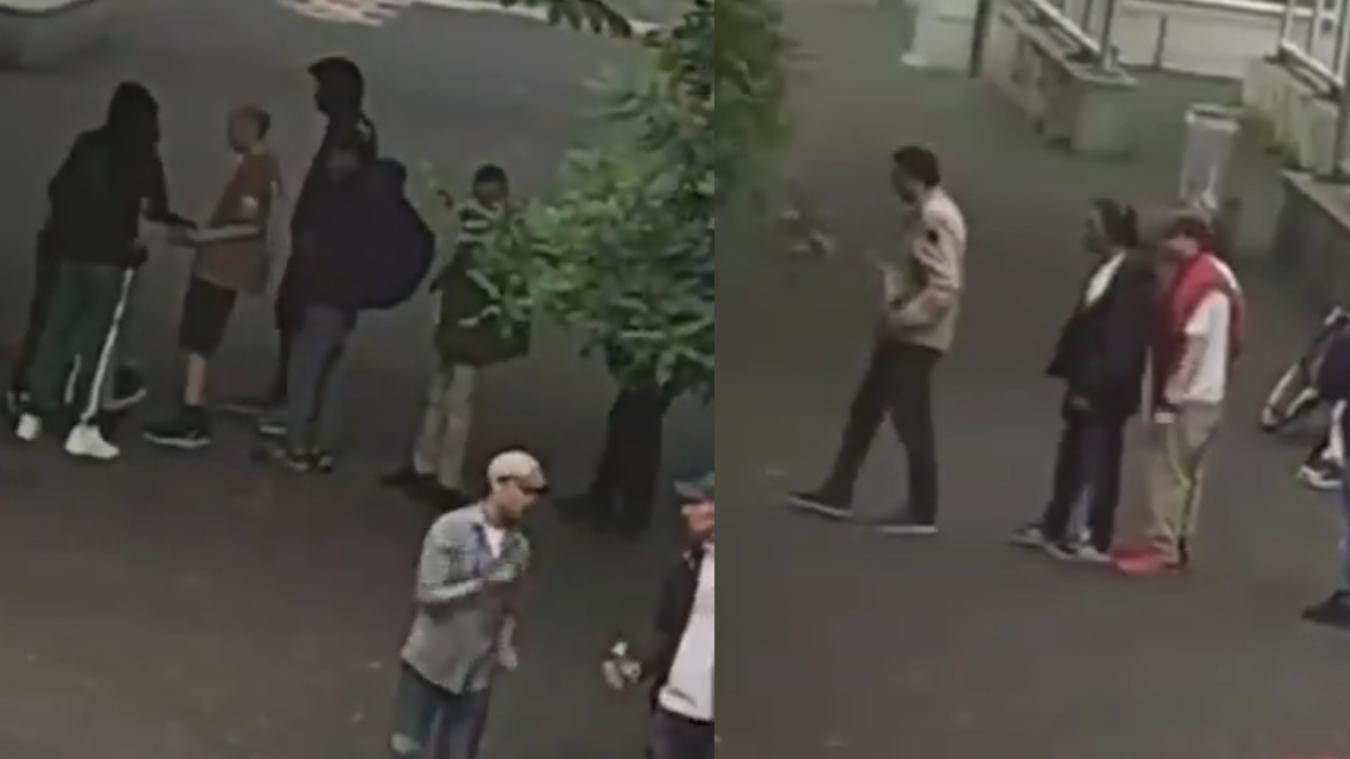
Stills from the video. Credit: David Crunelle / All rights reserved
"I posted a portion of the video to put the situation into context to say: these are victims, people in need," Crunelle told The Brussels Times. "They're not just drug dealers and it's not just a ‘supermarket of drugs’ like people are posting today."
Crunelle, a former longtime Saint-Gilles resident, asked Francken to take it down but was ignored and subsequently blocked by the Flemish nationalist politician. A section of the French-speaking press even published the video, without the artist's consent, reporting on the issue as if it happened yesterday.
But the video was taken before the huge police operation was unleashed all around Porte de Hal and the surrounding area between April and July. After hundreds of arrests, the dealers in the square have since disappeared.
Over the summer, public spaces have been "reclaimed" by locals, organising numerous activities which were aimed at mobilising the local community and taking back control of the area.
Mayor defends community
With the video circulating in the run-up to the municipal elections, the Mayor of Saint-Gilles Jean Spinette (PS) weighed into the fallout to say it was "unfair" and "we're in a completely different chapter" since the video was taken.
"We won back [Square Jacques Franck] and this success – which is undoubtedly temporary because nothing is ever won – is also due to the fact that the citizens started to say enough is enough," Spinette told The Brussels Times.
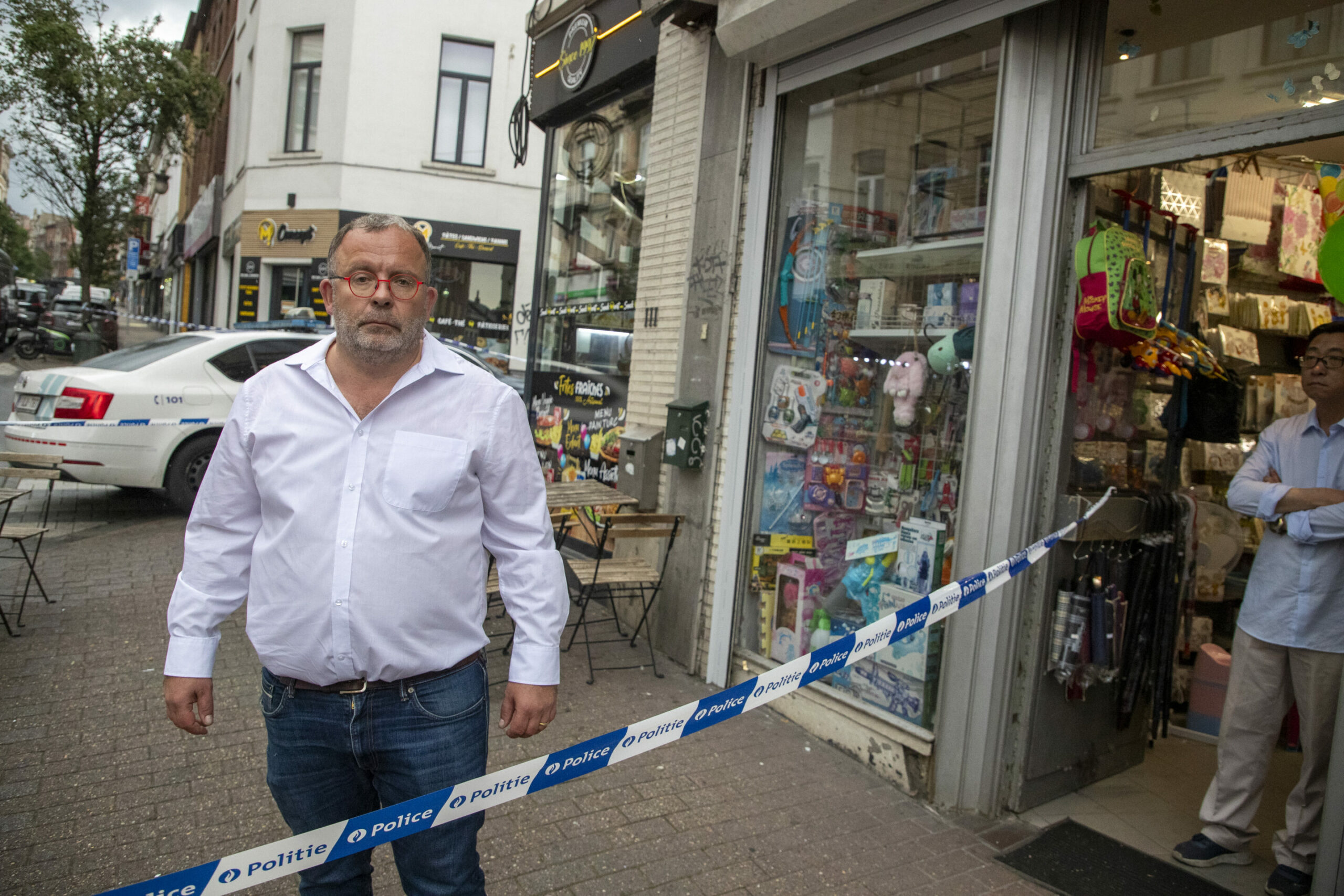
Saint-Gilles Mayor Jean Spinette. Credit: Belga / Nicolas Maeterlinck
Over these months, handguns, drugs and nearly €100,000 in cash were seized, with hundreds of arrests and 36 people charged for offences including kidnapping, assassination, violent robbery, money laundering and drug possession and sale. A total of 14 minors were also arrested, five of whom were brought before a juvenile court judge.
While Mayor Spinette points to the work being done on the ground, he does not shy away from the serious problems still facing the Belgian capital’s fight against insecurity and drug trafficking. He draws attention to the fact that many of those arrested are vulnerable young people and undocumented migrants, who are employed by "drug mafias" to sell on the street.
"They recruit people in very precarious situations. Young people can earn enough to buy trainers, and undocumented people can earn enough to eat. But they all risk their lives," Spinette continued.
Just last week, Belgium's outgoing Federal Government was condemned by the Council of Europe for failing to find a solution for the shortage of places for asylum seekers, calling it a "systemic problem". Due to the reception crisis, these individuals end up on the street, leaving them vulnerable and easily exploitable.
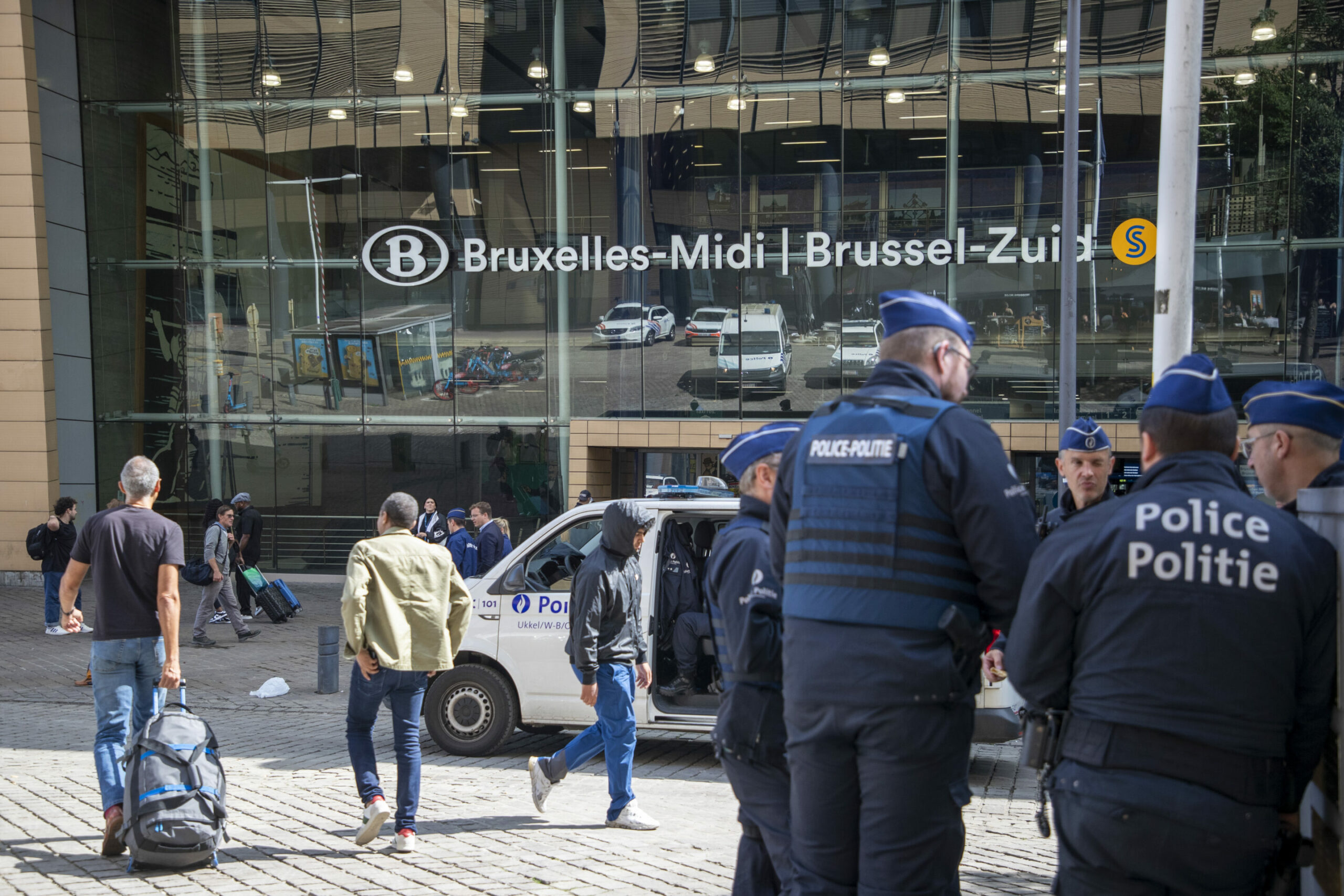
Police officers at Brussels-Midi station, Saturday 26 August 2023. Credit: Belga / Nicolas Maeterlinck
Under new federal rules, if the same undocumented person is detained several times for an offence such as drug dealing, they would now be deported. But Spinette says there is no room to detain them and they usually just return to dealing. "People don't give a damn about the police. The police stop them, stop them, stop them. They come back. Others are hired within ten minutes."
The working-class district of lower Saint-Gilles has seen a marked rise of poverty and social problems following the Covid-19 pandemic and the lockdowns, which exacerbated other social crises – but also culminated in the occupation of public space by dealers, according to Spinette.
"I was at Place Bethléem, 200 metres away from the Square Jacques Franck, and there are other dealers like them, also at the Parvis Saint-Antoine in Forest. Everyone is paying attention to Midi station and Saint-Gilles, but in fact it's all over Brussels."
'Act like kingpins'
While the criminal investigation is still ongoing, there are suspected links with one big organised network which is moving into deprived neighbourhoods and setting up street-level drug sales, using vulnerable people as cannon fodder.
"There are whole families, people, networks behind this. They do it in Marseille, Grenoble, Toulouse, operating in the most deprived neighbourhoods where they can act like kingpins."
While many investigations are still open, Spinette also believes there are links with the Peterbos gangs and the social houses in Forest – other neighbourhoods which have been at the heart of drug trafficking problems in Brussels.
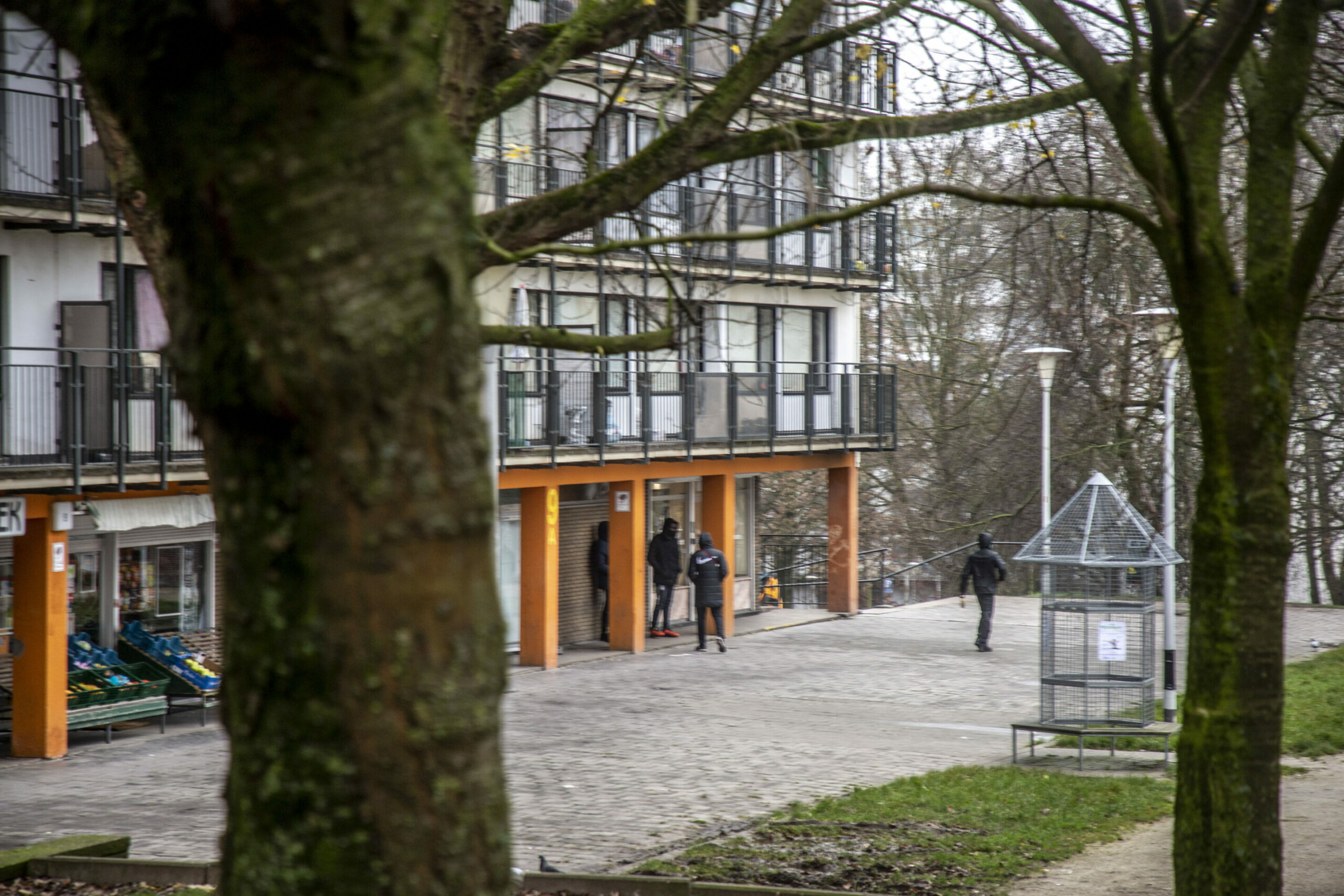
Council estates in the Peterbos neighbourhood, in Anderlecht, Brussels, after a police action in the area, Tuesday 14 December 2021. Credit: Belga / Hatim Kaghat
"The drug mafia is exploiting poverty. So if you don't cut off the money and the networks upstream, we'll always have shit on the ground," Spinette continued.
The municipality is also working with anti-mafia organisations such as BASTA! to transpose the Palermo model of citizen mobilisation against organised crime, with local citizens speaking up (in numbers) to say: enough is enough.
One example was the 60 or so community events organised in the square over the summer. "We've been doing them for years, but people are afraid. I was with the residents and the little old people who have always lived there – there are lots of great people," Spinette said, before admitting locals felt abandoned.
Having been attacked in the street himself last June, the Mayor of Saint-Gilles has not shied away from being omnipresent on the ground. When visiting the Place de Bethléem last week, he was himself confronted by the street sellers.
"I was there for an hour, where I saw many cars driving past yesterday: a guy with his girlfriend, the guy in a Porsche from Uccle. I saw everything. They stop, they take their baggie and they leave. It’s a tragedy. And the dealers were saying to me: well, Mr Mayor, are you getting annoyed?"
‘Verlinden never seen again’
These issues extend well beyond the borders of Saint-Gilles. On this, the mayor has been asking for federal help but says the government’s behaviour has been "a joke".
Interior Minister Annelies Verlinden parachuted into Brussels-Midi station in August 2023 for a huge "clean-up operation" after being largely spurred on by Flemish media. "She turned up with cameras to say that she had come to save Brussels. But she left the next day and was never seen again."
Spinette says he was also promised a new police station located inside Brussels-Midi station itself to help stem petty crime at the international travel hub. "You have to see the police station they promised me. They've painted me a cubby hole and tiled the floor, they've just revamped what was there 15 years ago," Spinette says.
The presence of migrant reception centres in Brussels-Midi, put there by the Federal Government, has not helped. While being in favour of helping vulnerable asylum seekers and undocumented migrants, Spinette sees it as a cynical federal policy which intentionally strains underfunded local police forces and the work of social services.
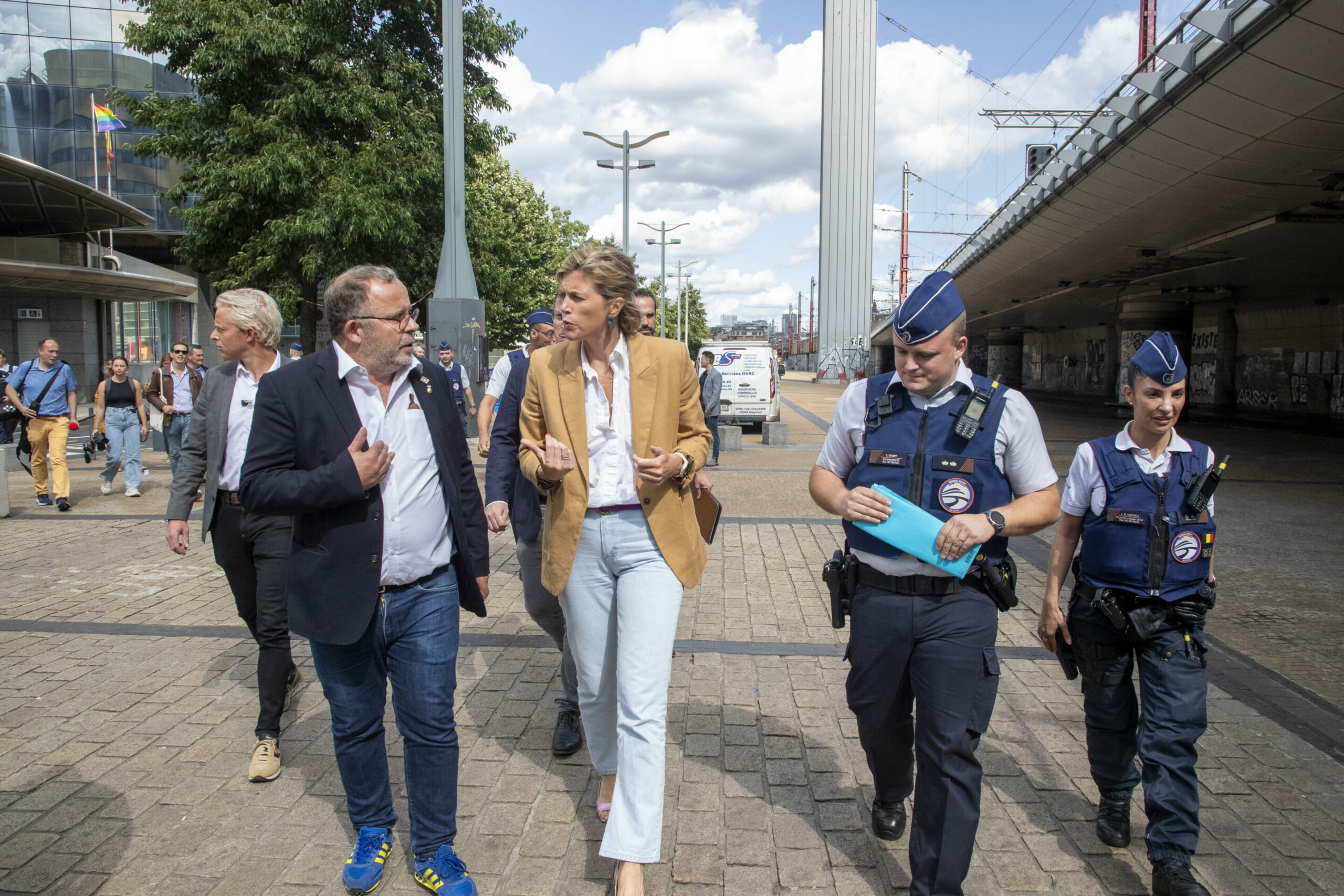
Saint-Gilles Mayor Jean Spinette and Interior Minister Annelies Verlinden pictured during a police action related to crime around Brussels-Midi station, Saturday 26 August 2023. Credit: Belga / Nicolas Maeterlinck
"I can tell you that we have asked for a dispersal plan. If you put three Syrians or three Afghans per village, it's more effective than if you put 4,000 around Brussels-Midi station," Spinette says. "They do it on purpose because then it's foreigners who get recruited. Then it's the foreigner who is the problem. So what's more, it's cynical and they're screwing things up in Brussels."
Among the things federal actors could actually help with, Spinette lists the funding for a functioning judicial police force, installing a Public Prosecutor's Office for Brussels (as they have not been able to appoint one because of language issues), as well as strengthening the federal police and its budgets – all promises which have not been kept.
Le Bronx
Liberal right-wingers MR are campaigning on the issue of security in Brussels but also across the country, which helped them win in Brussels on 9 June. Francken is friends with MR leader George Louis Bouchez, Spinette adds. The lead MR candidate in Saint-Gilles for the local elections shared Crunelle’s video last week with a caption calling the commune "the Bronx".
"He's playing with fire. In fact, he doesn't know the area well," Spinette responds, adding that MR are presenting themselves as the solution to the security issues. "So they're putting on a show."
But Brussels (once again) finds itself cornered by hostile forces from the French-speaking and Flemish right. "I've been in Charles Piqué's office since the beginning, when he set up the Brussels Region. I've been observing it for 25 years. I might as well tell you that Flanders has always wanted Brussels. It didn't want Brussels to be autonomous."
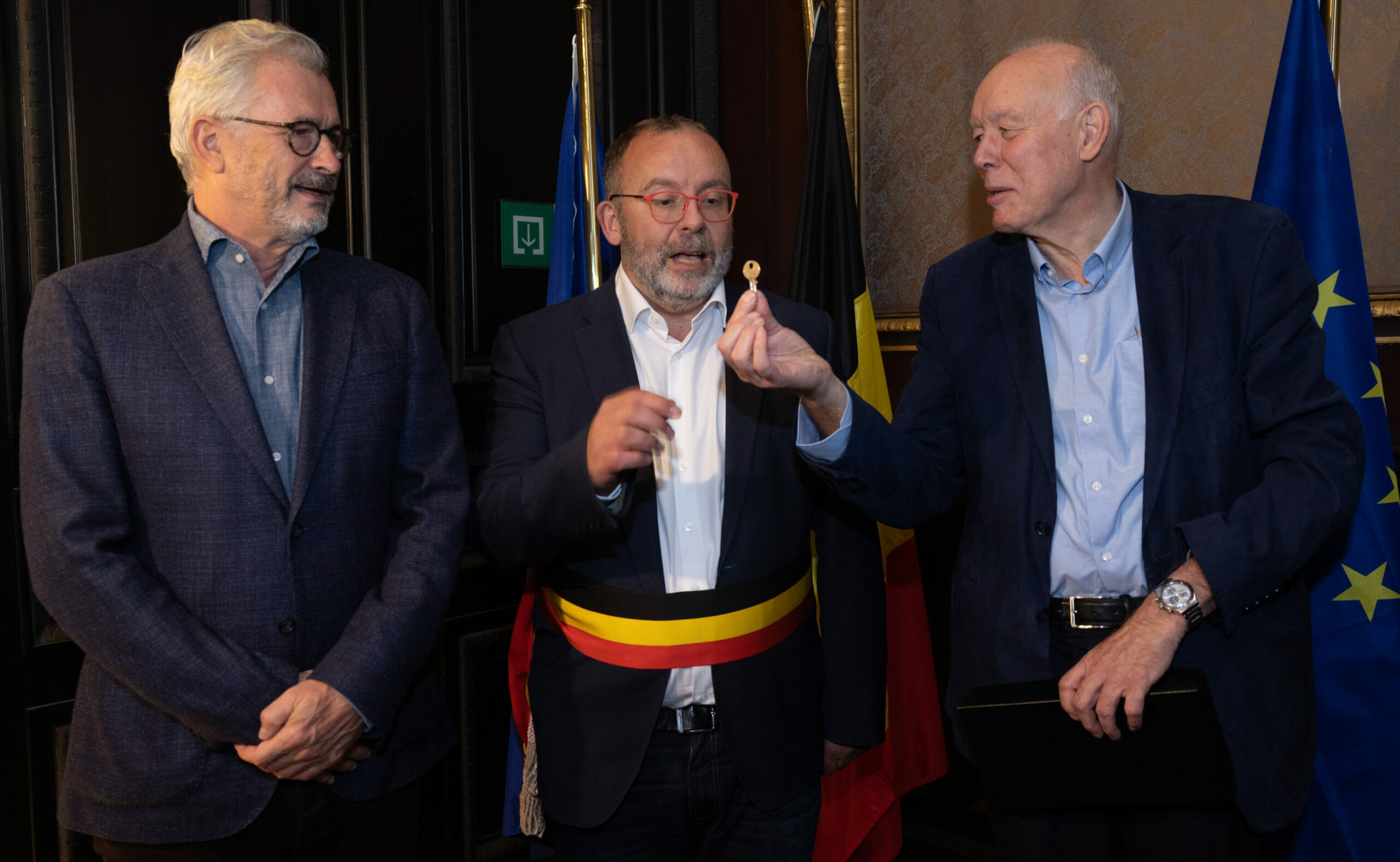
Spinette (centre) receiving the keys of the commune from outgoing Mayor of Saint-Gilles on Wednesday, 14 September 2022, in Brussels. Credit: Belga / Benoit Doppagne
Spinette is undoubtedly a proud Saint-Gillois and a fierce defender of his city. The socialist had big shoes to fill when he replaced his former boss Charles Piqué as mayor two years ago, with his predecessor having run the commune since 1985.
The onset of powerful drug mafias, the Federal Government’s mismanagement of asylum seeker reception centres and the succession of health and economic crises, coupled with the rise in poverty levels in lower Saint-Gilles, has thrust the spectacled local politician into the limelight.
The narrative against the Belgian capital and its insecurity problems is fierce. Moreover, diffusing decontextualised videos of social problems, usually involving non-white migrants, has been the European far-right’s sharpest weapon since the arrival of social media – and proves to be effective at the ballot box.
"It's all nonsense. Yes, we're in a city centre where there are muggings, where there are lost souls, where there are mad people, where all kinds of things happen. But all they are trying to do is tarnish the image of Brussels and my commune."

